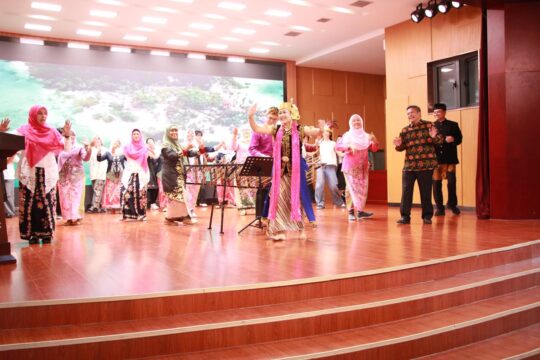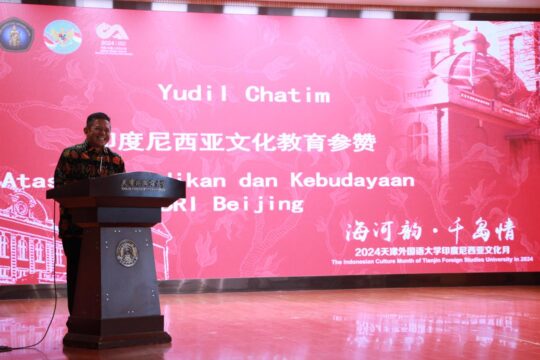Universitas Brawijaya (UB) officially opened the The House of Indonesian Culture or Rumah Budaya Indonesia (RBI), at Tianjin Foreign Studies University (TFSU), China, on Friday (5/10/2024). It is one groundbreaking effort to carry through the Globalizing UB Program, bringing UB to international level.
The establishment of this RBI stems from the cooperation of the Faculty of Cultural Studies (FCS) UB with TFSU, which has been established since 2012. When returning to China at the end of 2023 on the Lecturer Working Program, a team from FCS UB consisting of the Dean and lecturers of the Study Programme of Chinese Literature also visited Chinese Embassy.
“At the time, the Consulate General was not in place, so the Attaché for Education and Culture received us, Yudil Chatim, SKM., M.Ed., and also the Attaché for Commercial, Budi Hansyah,” explained Hamamah, Ph.D., Dean of FCS UB.
Yudil Chatim said that in China, 25 universities have Indonesian language study programs, but there has not been any reciprocal cooperation of higher education from Indonesia to China. This is the first ever reciprocal cooperation between University of Indonesia and China.
“Therefore, we asked the Attaché for Education and Culture to help open a kind of Indonesian corner in university with Indonesian language study program,” Hamamah continued.
Unexpectedly, the response was favorable. Responding to FCS UB’s intention to visit TFSU the next day to initiate the planned reciprocal cooperation, Yudil Chatim explained that TFSU has an Indonesian language study program, and they have opened a Korean corner. They want to open an Indonesian corner and have asked the Indonesian Embassy about it.
It was finally agreed from the discussion that the Indonesian Corner project to be established at TFSU would be handed over to FCS UB and named Rumah Budaya Indonesia (The House of Indonesian Culture).
TFSU welcomed the initiation. The Vice Rector IV of TFSU warmly welcomed the delegates from FCS UB. TFSU then showed that the room that will be used for the Indonesian corner is their historical 100-year-old building, with the size of 8x10m2. Indonesia is honored to have the historical building in China as the place for exhibiting Indonesian Culture.
Yudil Chatim said that in China, 25 universities have Indonesian language study programs, but there has not been any reciprocal cooperation of higher education from Indonesia to China. This is the first ever reciprocal cooperation between University of Indonesia and China.
“Therefore, we asked the Attaché for Education and Culture to help open a kind of Indonesian corner in university with Indonesian language study program,” Hamamah continued.
Unexpectedly, the response was favorable. Responding to FCS UB’s intention to visit TFSU the next day to initiate the planned reciprocal cooperation, Yudil Chatim explained that TFSU has an Indonesian language study program, and they have opened a Korean corner. They want to open an Indonesian corner and have asked the Indonesian Embassy about it.
It was finally agreed from the discussion that the Indonesian Corner project to be established at TFSU would be handed over to FCS UB and named Rumah Budaya Indonesia (The House of Indonesian Culture).
TFSU welcomed the initiation. The Vice Rector IV of TFSU warmly welcomed the delegates from FCS UB. TFSU then showed that the room that will be used for the Indonesian corner is their historical 100-year-old building, with the size of 8x10m2. Indonesia is honored to have the historical building in China as the place for exhibiting Indonesian Culture.
“In The House of Indonesian Culture, we present a static reading room or exhibition space and involve the ABCGM (Academic, Business, Community, Government, and Media). We will present a dynamic exhibition space there. We plan to change the topic annually or every semester. We will present the Indonesian Language for Foreign Speakers, and everything related to the Indonesian language,” said Hamamah.
“We plan to present Indonesian culture along with the Chinese descendant community in Malang, to involve ethnic artists for the opening, and to exhibit Indonesian musical instruments, traditional clothes, and so on,” she continued.
“This year’s theme is Historical Interconnection of Chinese-Indonesian Culture, so we display Chinese-inspired Indonesian cuisine, such as meatballs, tofu, etc. We also display Chinese-inspired batik, namely Batik Lasem, Kebaya Encim Betawi, which historically interconnected with Chinese culture,” she explained.
In this first period, FCS UB will involve four study programs in the opening of The House of Indonesian Culture, namely Indonesian Language and Literature Education (SPILLE), Fine Arts (SPFA), Anthropology (SPA), and Chinese Literature (SPCL). The SPFA is mandated to work on batik, the SPA will explore the history of Chinese-Indonesian cultural interconnections, and the SPCL will handle the translation of everything related to RBI. At the same time, the SPILLE is responsible for matters related to the Indonesian Language for Foreign Speakers (BIPA) and the Indonesian Language Proficiency Test (UKBI).
The Rector of UB, Prof. Widodo, S.Si., M.Si., Ph.D.Med.Sc., said that everyone was present at this event to witness an momentous cross-border educational and cultural collaboration between two universities and two countries.
“I hope everyone here feels proud to have been allowed to be a part of this collaboration, as I am,” says Prof. Widodo.
“On this occasion, we are proud to announce the foundation of The House of Indonesian Culture in TFSU, China, a collaborative project between UB and TFSU. Hopefully, this cooperation will be an extraordinary opportunity, not only for scholars, academics, and cultural enthusiasts but also for the wider community as a whole,” he continued.
“First of all, I would like to express my sincere appreciation to the organizing team from the Faculty of Cultural Studies at Universitas Brawijaya and from Tianjin Foreign Studies University, who have spent a tremendous amount of time, resources, and energy to initiate this project,” he stated.
Furthermore, Prof. Widodo also expressed his gratitude to the partners who have made this agenda possible, including (1) the Indonesian Ministry of Education, Culture, Research and Technology for supporting this agenda to bring Indonesian cultural education to China; (2) the Embassy of the Republic of Indonesia in China – especially the Education and Culture Attaché – for providing the necessary connections and information for the establishment of the Indonesian House of Culture, as a means to strengthen Indonesian and Chinese diplomacy, and hopefully open the door to broader cooperation between the two countries; (3) The Consulate General of the PRC in Surabaya, Indonesia, for its continuous support, especially in providing the necessary administrative requirements for this project and being an essential factor in maintaining UB’s relationship with PRC institutions; and (4) The Chinese Diaspora Community in Malang City, for providing materials to exhibit and stories and lessons we can learn from.
This project is expected to be a long-term collaboration between UB and TFSU, with the hope of creating an annual exhibition with a different theme (each year), leading to more intensive cooperation in culture and language learning.
“In the long term, we hope that RBI will not only be an exhibition venue but also function as a center for education, culture, and creative activities related to Indonesia, as well as a symbol of cooperation between the two institutions and the two nations,” he added.
“One of UB’s plans soon is to develop cooperation with TFSU to establish a language learning program as well as a test center for Indonesian for Foreign Speakers (BIPA). It is hoped that this center can enrich and improve cultural understanding between the two countries, especially through language,” concluded Prof. Widodo.
Meanwhile, Yudil Chatim, Indonesian Education and Culture Attaché in Beijing in his speech invited to make this cooperation as a strategy for both countries to achieve tangible results that will bring benefits to mutual bond. Rumah Budaya Indonesia is a new building bridge for cultural diplomacy between Indonesia and China.
“Let us build strong relationships, foster a sense of brotherhood, and foster sustainable cooperation. Make our relationships and cooperation to strengthen the sense of brotherhood, kinship, and affection between us,” he said.
“I am confident that with the spirit of collaboration, we can achieve a brighter future for Indonesia, China, and the relationship between the two countries. Thank you for this opportunity, and I sincerely hope this event will mark a milestone that brings positive and real change,” he ended.
Those who attended the opening ceremony of The House of Indonesian Culture in Tianjin are the Rector of UB, the Rector of TFSU, the Vice-Rector for Planning, Cooperation and Internationalization of UB, the Vice-Rector IV of TFSU, the Vice-Rector for Research and Innovation of UB, the Education and Culture Attaché, the Dean of FCS UB, the Vice-Dean for General Affairs, Finance and Resources of FCS UB, the Vice-Dean for Student Affairs, Alumni and Student Entrepreneurship of FCS UB, lecturers of FCS UB and TFSU, as well as TFSU students and Indonesian students studying in China.
“Let us build strong relationships, foster a sense of brotherhood, and foster sustainable cooperation. Make our relationships and cooperation to strengthen the sense of brotherhood, kinship, and affection between us,” he said.
“I am confident that with the spirit of collaboration, we can achieve a brighter future for Indonesia, China, and the relationship between the two countries. Thank you for this opportunity, and I sincerely hope this event will mark a milestone that brings positive and real change,” he ended.
Those who attended the opening ceremony of The House of Indonesian Culture in Tianjin are the Rector of UB, the Rector of TFSU, the Vice-Rector for Planning, Cooperation and Internationalization of UB, the Vice-Rector IV of TFSU, the Vice-Rector for Research and Innovation of UB, the Education and Culture Attaché, the Dean of FCS UB, the Vice-Dean for General Affairs, Finance and Resources of FCS UB, the Vice-Dean for Student Affairs, Alumni and Student Entrepreneurship of FCS UB, lecturers of FCS UB and TFSU, as well as TFSU students and Indonesian students studying in China. [dts/PR FCS]





